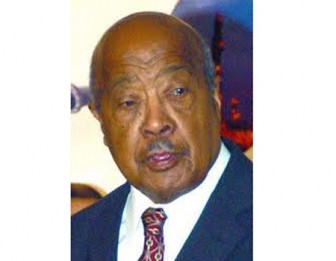(Trinidad Express) Trinidad and Tobago’s first President, Sir Ellis Clarke, died last night, two days after his 93rd birthday.
He had been recuperating at his home in Fairways, Maraval, following a massive stroke last month.
In a brief statement last night, his son Peter Clarke said: “Sir Ellis Clarke passed away peacefully at home on December 30 at 7.58 p.m. after having suffered a massive stroke on November 24 from which he never recovered.”
Clarke thanked everyone who had expressed best wishes during the time his father was ailing.
On the night of November 24, Sir Ellis was at home when he began experiencing slurred speech and impaired movements. He was taken to the Westshore Hospital in Cocorite where he remained for a little over two and a half weeks.
Sir Ellis Clarke was Trinidad and Tobago’s last Governor General and was elected President when Trinidad and Tobago became a Republic in 1976. He served two terms as President between 1976 and 1987.
Born to middle-class parents in Belmont in 1917, Sir Ellis received numerous awards during his illustrious career. He was one of the first recipients of the Trinity Cross, and in 1981 he received the Trinidad Express Individual of the Year Award.

Sir Ellis was a strong advocate of constitutional reform and was one of the authors of the T&T Constitution. His experience continued to be sought after his retirement in the areas of politics and business. Attorney General Anand Ramlogan in comments last night said: “Sir Ellis’s death signifies the end of an era and the fall of a giant.
“Sir Ellis was the chief architect and grandfather of our Constitution, which remains the supreme law. It has served us well as the cradle for the development of our society. Sir Ellis was the quintessential statesman and served with a rare sense of humility and purpose and an unassuming manner and great dignity so seldom seem.”
Ramlogan said in many ways the former President personified the glue that held together the social jigsaw puzzle of T&T in the immediate pre-independence and post-independence era. He said Sir Ellis was able to use the office of President to reach out to all, transcending the barriers of race, religion, colour and creed.
“He was a stabilising influence on the heated politics and injected a measure of social equilibrium in an otherwise volatile political situation,” Ramlogan added.
Sir Ellis is survived by his son, Peter, and daughter, Margaret-Ann Fisken. His wife, Ermintrude, died in 2002.




